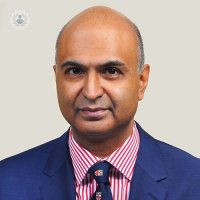Hypertension: how dangerous is it and what are the main symptoms?
Written in association with:Hypertension, also commonly known as high blood pressure, can lead to serious heart problems, such as stroke and heart failure but to name a few. Thus, it is vital that we take the required and recommended preventative measures to avoid allowing hypertension to develop and worsen.
Here to offer us his expert advice on how to effectively steer away from hypertension is revered adult cardiologist, Dr Vinay Kumar Bhatia. In this article, Dr Bhatia outlines the overall importance of diagnosing this condition, the most effective treatment options for patients who suffer from hypertension, as well as the symptoms that patients should look out for.

What is hypertension and how dangerous is it?
Hypertension (high blood pressure) is one of the most significant preventable causes of both premature disease and premature death across the UK. Hypertension is a major risk factor for a variety of serious medical conditions, such as stroke, heart attack, heart failure, kidney failure as well as brain disease.
How is blood pressure measured and what causes blood pressure to rise?
Commonly, blood pressure is measured by a sphygmomanometer at one’s local GP practice. However, this is a constantly-changing parameter, as it depends entirely on your state of mind and what exactly you have been doing prior to having your blood pressure taken.
People can suffer from high blood pressure as a result of genetic disposition, but is most commonly caused by people’s lifestyle.
What are the main symptoms of hypertension?
In most cases, patients do not actually present any initial symptoms of hypertension, and appear to be in a very healthy state indeed. In fact, it is frequently diagnosed incidentally during routine medical check-ups.
The commonest symptoms of hypertension that patients often suffer from include the following:
- breathing difficulties
- chest discomfort
- palpitations
- visual disturbance
- headaches
- urinary problems
- feeling generally unwell

How is hypertension diagnosed?
Generally, a 24-hour blood pressure monitor is advised. The patient will then need to be examined by their doctor, which will involve the carrying out of blood and urine tests. He or she will also then typically request an electrical recording of the patient’s heart rhythm.
Another test that is commonly recommended is a cardiac ultrasound (echocardiogram) test.
How important is a healthy lifestyle in terms of reducing the risk of hypertension?
An unhealthy lifestyle can certainly result in a progression of hypertension. If one has a generally unhealthy diet, drinks alcohol on a regular basis, does not exercise frequently, is overweight and smokes, they are absolutely at risk of suffering from hypertension.
Adopting a healthy lifestyle is thus paramount in the attempt to reduce our risk of developing high blood pressure. It is also highly recommended to engage in effective stress management in our daily lives, as stress at work, and indeed home, can greatly increase our chances of developing hypertension.
What are the treatment options?
The most effective treatment for hypertension comes in the form of taking long-term blood-pressure-lowering tablets.
Dr Vinay Kumar Bhatia is an exceptionally well-regarded adult cardiologist who possesses expert knowledge on heart-related conditions such as hypertension. If you are worried about your blood pressure, you can book an appointment with Dr Bhatia by visiting his Top Doctor’s profile here.


